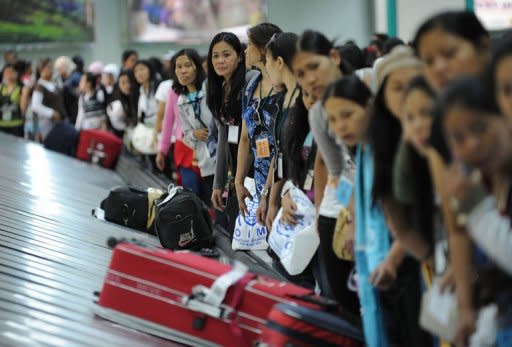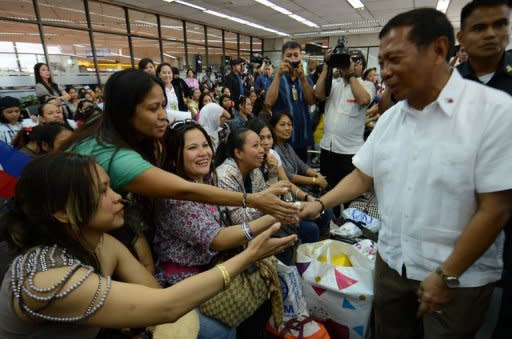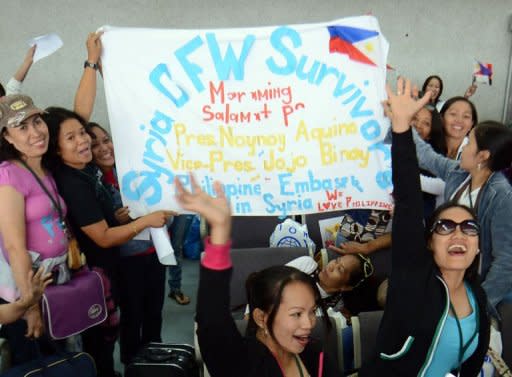Philippine maid escapes employer to flee Syria
A Philippine maid gave a dramatic account of how she escaped her demanding employer to flee besieged Syria, by sliding down a rope after he refused to let her quit her post as war raged around them. As the country was torn apart by civil war fearful Nurmina Canapia pleaded to leave the country along with hundreds of other maids, but her Syrian boss insisted she stay and see out the final year of her three-year contract. The last straw came when a bomb exploded outside her employer's home in Aleppo and still he would not let her go, despite the Philippine consulate advising all Filipinos evacuate, the 33-year-old said. "My employer was so mad. He said I would not be able to leave till I finished my three-year contract," Canapia told AFP. "I climbed down from the balcony of the house with a rope. Then I called a taxi and went to the Philippine consulate in Aleppo," the mother of three, from the impoverished southern Philippines, recalled. "My employer went to the consulate and tried to get me back, but the consulate would not let me go. They said all Filipinos must leave Syria," she said. After reaching the consulate, Canapia, along with another 262 domestic maids from the Philippines, were driven to Damascus where they were flown by charter plane to Manila on Tuesday. A further 20 are scheduled to arrive late Tuesday on a regular flight, the Philippines foreign department said. The Philippine government has repatriated more than 2,100 workers from Syria since December last year. About 5,000 remain in the country, although the government says it is seeking to bring home as many as possible. One Philippine maid was killed in the war, when she and her employers were ambushed by unknown gunmen in a car, Foreign Secretary Albert del Rosario told reporters. "Our policy is not to leave anyone behind. Anyone who wants to come home, we will bring him (or her) back," del Rosario said as he welcomed the women at Manila airport. He said some 600 Filipinos were still waiting to return home from Syria, with a third of them in hiding in various parts of Aleppo. But 3,000 more said they did not want to leave the country, believing their employers would protect them, the minister said. The government cannot force Filipinos to return, del Rosario added, saying it was difficult to find all of its nationals since many, including minors, had entered Syria to work illegally. One of the repatriated minors, 17-year-old Archelle Araojo, said she had worked in Aleppo since she was 15 and had been terrified by the outbreak of violence there. Earlier this month she was on the balcony of her employer's home when she saw helicopters and tanks arriving to attack a group of rebels. "I was so scared. My employer told us all to just sit down in the bathroom. We stayed there for days. We had nothing to eat because the stores were all closed and we couldn't go out," she told AFP. During a lull in the fighting the entire household fled by car to Damascus, 310 kilometres (193 miles) away, where her employers dropped her off at the Philippine embassy with advice to go home, while the family fled to Lebanon. Araojo, who said she no longer wanted to work abroad, told AFP virtually all the money she sent home from Syria had been spent on her ailing mother, leaving her with savings of just $100. Araojo is one of almost 10 million Filipinos who have gone to work around the world, earning money which they can send home to their impoverished homeland. While the money they earn is a major boost to the economy, the government has also been forced to scramble to evacuate hundreds of them from strife-torn areas like Lebanon and Iraq in the past decade.




